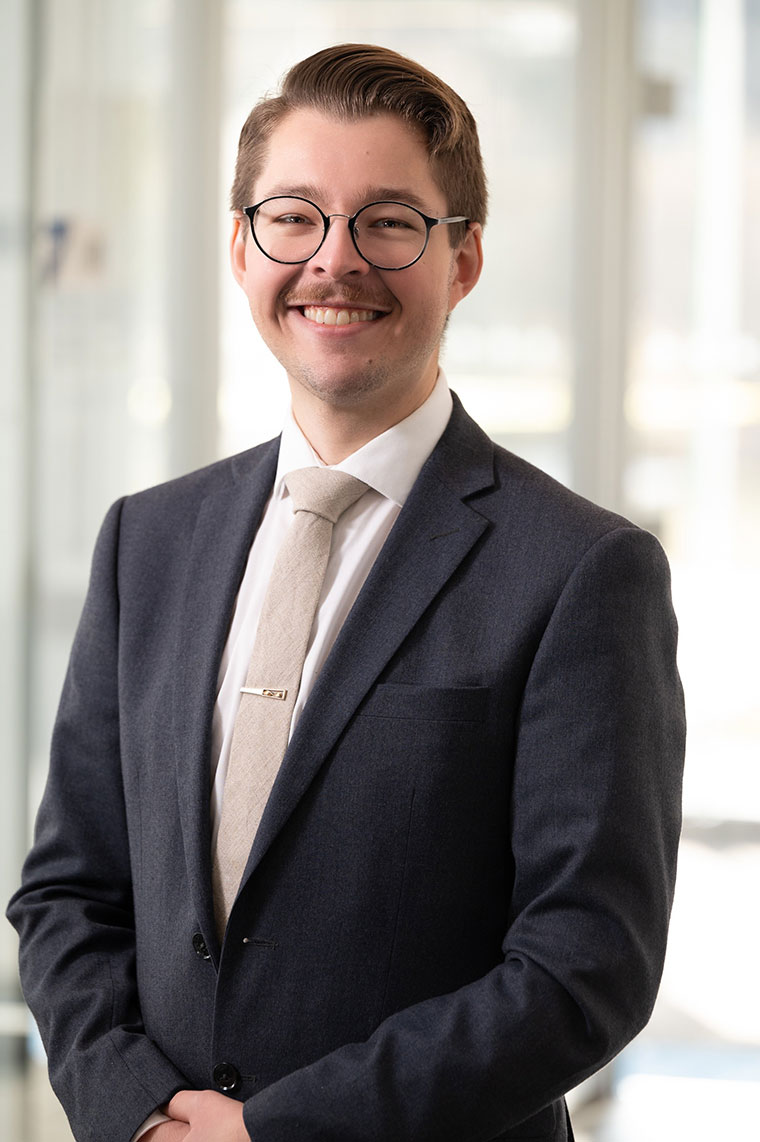Profile
Dr. Sébastien Belliveau
Montreal, Que.

When your father is a surgeon and brings you — as a five-year-old boy — to work with him while he practises in the operating room, it’s fair to say being a physician is in your genes. Or, as Dr. Sébastien Belliveau ironically calls it, “a classic origin story.”
Joining the MD Physician Council last fall, Dr. Belliveau brings an early-career perspective with him, as he is completing his residency in urology at the Université de Montréal.
There, he serves as a hard-working trainee, learning from senior physicians, nurses and those for whom he provides care. “It is a busy, dynamic environment, but connecting with patients is an amazing reward,” Dr. Belliveau says.
“Patients have incredible stories, and by taking the time to listen to them, I can gain so much insight on their experience in the healthcare system and beyond. I have the opportunity to live a thousand lives through them.”
He is drawn to that human connection as well as the ability to influence often immediate improvements in people’s health. Dr. Belliveau recalls a recent patient in the ICU who had experienced hemorrhagic shock. After receiving support on the urological side, the patient and his family were so thankful for the team’s ability to take charge of the situation. “To be able to help patients, and be there for them in difficult moments, is extremely gratifying,” he says.
While Dr. Belliveau has spent most of a decade in university, serving even as class president and valedictorian at McGill, he says that residency has been an entirely humbling experience. He credits his mentors with teaching him more than he could have imagined when it comes to practising medicine.
One such learning is the pace of innovation, with new tools (for instance, AI) changing the face of information and knowledge acquisition. “It’s both interesting and scary,” says Dr. Belliveau. “There’s a lot to stay on top of as a trainee to integrate your learning into your general knowledge.”
As Dr. Belliveau moves forward in his career, he intends to prioritize a meaningful work-life balance — just as he knows many of his fellow trainees are planning.
“Younger doctors are less inclined to work 70–100 hours a week. Yes, you have to devote yourself to medicine, but a lot of us are questioning the model of how physicians are typically expected to work.”
Dr. Belliveau says he’s already experiencing a heavy workload, but understands that in residency, the only way to learn is by doing. So, he is laser-focused on his goal to succeed in his eventual independent practice.
A sustainability-minded trainee, Dr. Belliveau also wishes to do what he can to advocate for clinical environments to become more eco-conscious and less waste emitting. “In truth, every sector needs to change, and it starts with challenging the ways that things are,” he says.
His area of research interest focuses on the potential overuse of single-use plastics in surgery and bringing greater sustainability to medical interventions. While patient safety can’t be compromised, even ideas such as rethinking the number of disposable gowns used in an otherwise clean, targeted procedure could reduce considerable amounts of medical waste.
Moving the needle on sustainability in a different way was in fact one of the reasons Dr. Belliveau reached out to join the Physician Council even before MD Financial Management (MD) put out the call for applications. He also seeks the opportunity to represent the real-time needs of medical students and junior physicians, which includes, of course, financial considerations. Trainees, he says, are in a unique place as they are expected to work long hours with lower earnings despite likely graduating with debt.
“In medical school, we cover basic topics like debt, but not principles of accounting,” he says. He has learned through colleagues that a deeper understanding of investments and insurance is needed to stay well on top of billing, tax structures and how an evolving career can complicate the financial forecast.
He says he feels fortunate to have been a client of MD for many years — first as a family member through his father and now as a physician himself. “I appreciate my Advisors, who check in with me, help me keep things in line, and build a financial roadmap that works,” he says. “Given that doctors have very little time to build financial literacy, it’s important to have someone to speak with who you can trust.”
Back to Physician CouncilMD Financial Management provides financial products and services, the MD Family of Funds and investment counselling services through the MD Group of Companies and Scotia Wealth Insurance Services Inc. For a detailed list of the MD Group of Companies visit md.ca and visit scotiawealthmanagement.com for more information on Scotia Wealth Insurance Services Inc.